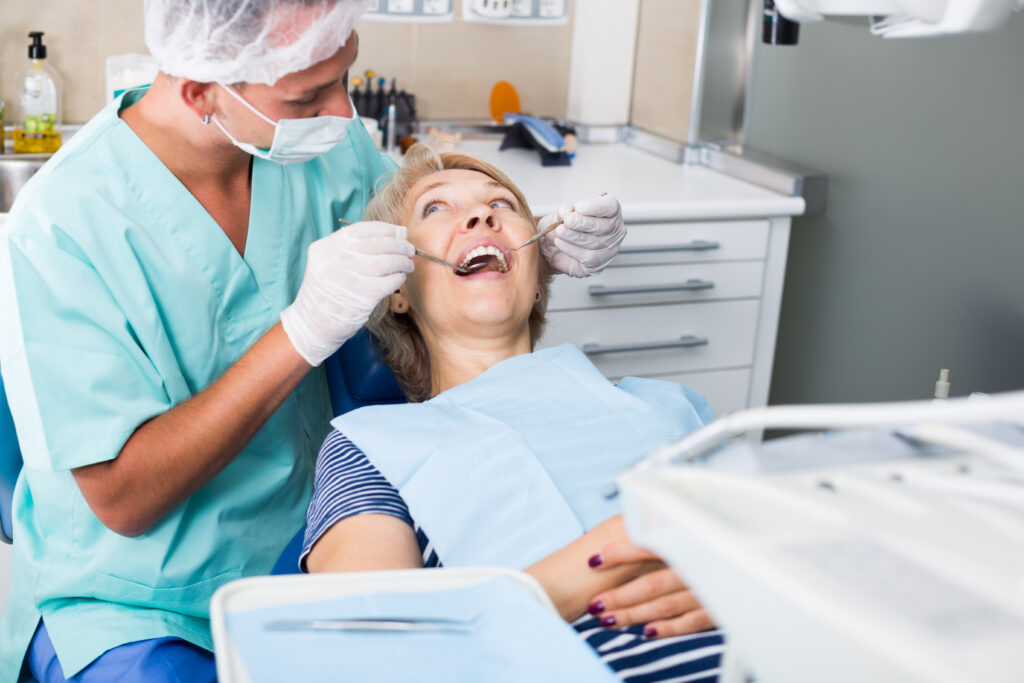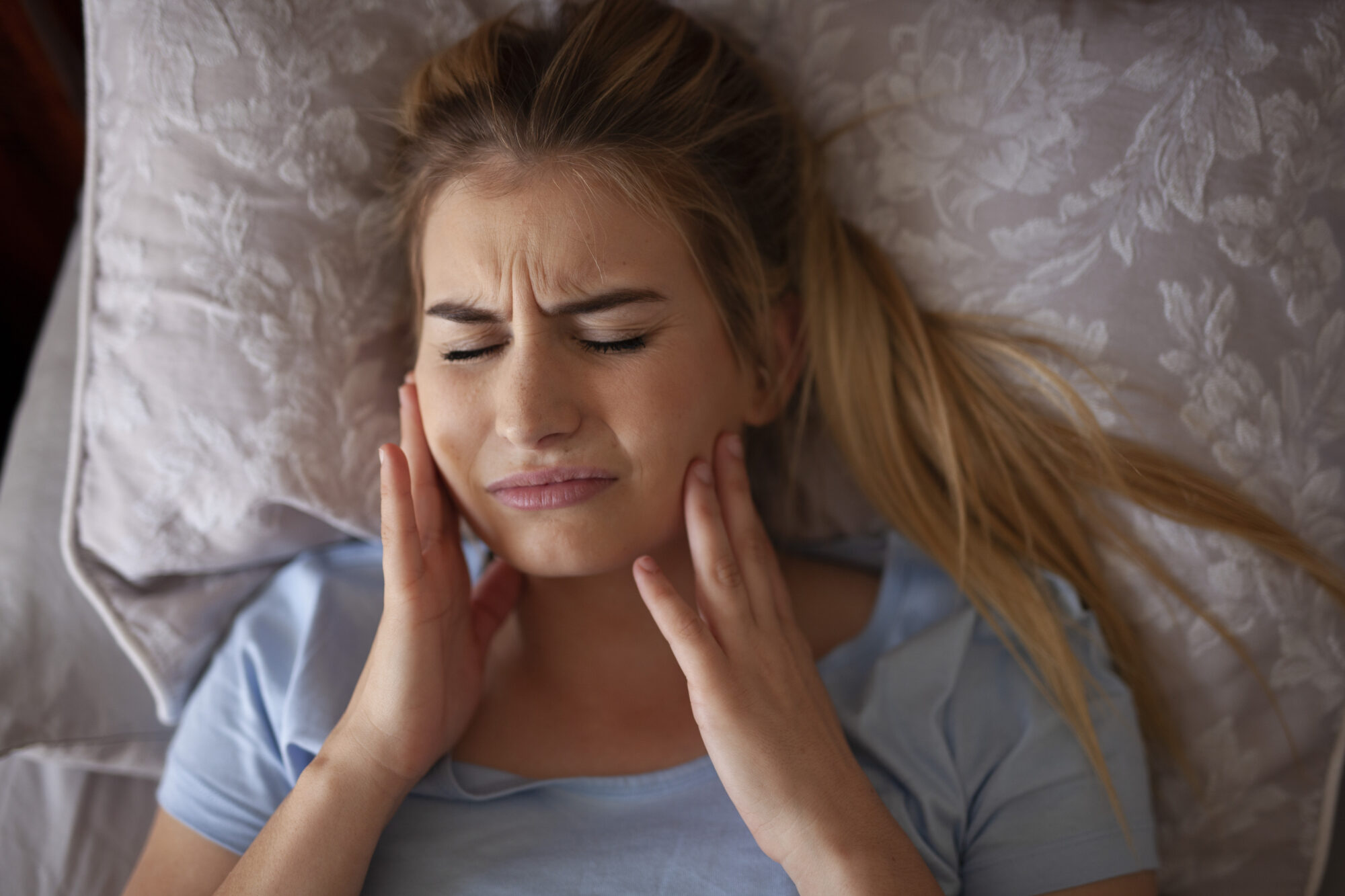Are you waking up with a sore jaw or a headache, wondering what’s causing it? You’re not alone. Many adults experience teeth grinding, also known as bruxism, during sleep, often without realizing it. At Byrne Orthodontics, where experts like Dr. Brian Byrne and Dr. Natalie Pinckney offer comprehensive care, we educate patients on this common yet often overlooked condition.
Understanding Teeth Grinding (Bruxism)
Teeth grinding, medically termed bruxism, is more than just an occasional inconvenience; it’s a condition that many adults encounter during their sleep.
Characterized by the clenching or grinding of teeth, bruxism often occurs unconsciously, leaving many unaware of their condition until symptoms become noticeable. It’s not just a nighttime issue; some individuals may find themselves grinding their teeth during the day, especially in times of stress or concentration. Understanding the nuances of bruxism is the first step toward effective management, a journey that the skilled team at Byrne Orthodontics is well-equipped to lead you through.
Causes of Teeth Grinding
Unraveling the causes of teeth grinding is crucial in crafting effective treatment plans. While the exact cause can vary from person to person, several common factors are often at play:
- Stress and Anxiety: High levels of stress or anxiety are frequently linked to teeth grinding. During sleep, the stress and tension experienced during the day can manifest as clenching or grinding.
- Sleep Disorders: Conditions like sleep apnea, where breathing is periodically interrupted during sleep, can be associated with bruxism. The disruption in sleep patterns may trigger teeth grinding.
- Dental Misalignment: Imperfect alignment of the teeth or jaw can lead to uneven pressure distribution in the mouth, potentially causing bruxism as the jaw seeks a more comfortable position.
- Lifestyle Factors: Habits such as excessive alcohol consumption, smoking, or high caffeine intake can exacerbate teeth grinding.
- Medications and Other Health Conditions: Certain psychiatric medications, neurological disorders, and even complications from diseases can sometimes lead to bruxism as a side effect.
Understanding these factors is a vital component of the holistic approach that we take at Byrne Orthodontics, ensuring each patient receives personalized care tailored to their specific needs.

Symptoms and Impact on Oral Health
Recognizing the symptoms of teeth grinding is key to preventing long-term damage to your oral health. Common indicators of bruxism include:
- Jaw Soreness or Pain: One of the most immediate symptoms, often felt upon waking.
- Headaches: Particularly in the temple area, resulting from the tension of grinding.
- Tooth Wear: Unusual wear patterns on teeth, potentially leading to sensitivity or damage.
- Sleep Disruption: Both for the individual grinding their teeth and their sleep partner.
Chronic teeth grinding doesn’t just cause discomfort; it can have lasting effects on your oral health. Continuous grinding can lead to enamel erosion, increasing the risk of cavities and tooth fractures. It can also strain the jaw muscles and joints, potentially leading to temporomandibular joint disorder (TMJ), a condition that can cause further pain and difficulty in jaw movement.
Treatment Options and Orthodontic Solutions
Addressing teeth grinding effectively often requires a multi-faceted approach, and at Byrne Orthodontics, we tailor our treatments to suit each individual’s needs. Here are some of the key solutions we offer:
- Custom Night Guards: A primary treatment for bruxism, these guards are tailored to fit your mouth. They act as a barrier, protecting your teeth from the pressure and abrasion of grinding.
- Orthodontic Correction: If misalignment is a contributing factor to your bruxism, correcting the alignment with braces or clear aligners can alleviate the condition.
- Stress Management Techniques: Since stress is a common cause of teeth grinding, incorporating relaxation techniques and lifestyle changes can be beneficial.
- Addressing Underlying Sleep Disorders: In cases where sleep disorders are contributing to bruxism, we may recommend consultation with a sleep specialist.
- Adjusting Medications: If certain medications are the culprit, we collaborate with your healthcare provider to find alternatives that don’t exacerbate teeth grinding.
Our team is committed to providing comprehensive care. We don’t just treat the symptoms; we aim to address the root causes of your bruxism to ensure long-lasting oral health and comfort.
Lifestyle Adjustments and Home Remedies
In addition to professional orthodontic treatments, making certain lifestyle adjustments can significantly aid in managing teeth grinding. At Byrne Orthodontics, we believe in a holistic approach to treatment, which includes recommending changes and practices you can incorporate into your daily routine:
- Reducing Stress: Engaging in activities like yoga, meditation, or even regular exercise can help alleviate stress, a common trigger for bruxism.
- Mindful Relaxation: Techniques such as deep breathing exercises before bed can relax the jaw muscles and reduce the likelihood of grinding.
- Limiting Stimulants: Cutting down on substances like caffeine and alcohol, especially in the evening, can decrease teeth grinding as they are known to intensify it.
- Proper Jaw Alignment: Being mindful of not clenching your teeth during the day and practicing proper jaw alignment can help train your jaw to relax.
- Regular Dental Checkups: Routine visits to Byrne Orthodontics can help monitor your condition and adjust treatments as necessary.
At Byrne Orthodontics, we emphasize the importance of these simple yet effective practices in complementing orthodontic treatments, ensuring a comprehensive approach to managing teeth grinding.

Say Goodbye to Teeth Grinding: A Healthier Smile Awaits!
Teeth grinding in your sleep, though common, should never be overlooked, as it can have significant implications for your oral health and overall well-being. Understanding the causes, recognizing the symptoms, and seeking appropriate treatment are essential steps in managing this condition. At Byrne Orthodontics, under the experienced care of Dr. Brian Byrne and Dr. Natalie Pinckney, we focus on long-term health and comfort, ensuring that each patient receives the best care possible.
If you’re experiencing symptoms of teeth grinding or have concerns about your oral health, we invite you to schedule a free consultation with us. Let Byrne Orthodontics be your partner in achieving not only a beautiful smile but also a healthier, more comfortable life. Your journey towards optimal dental health is just a call or a click away!
